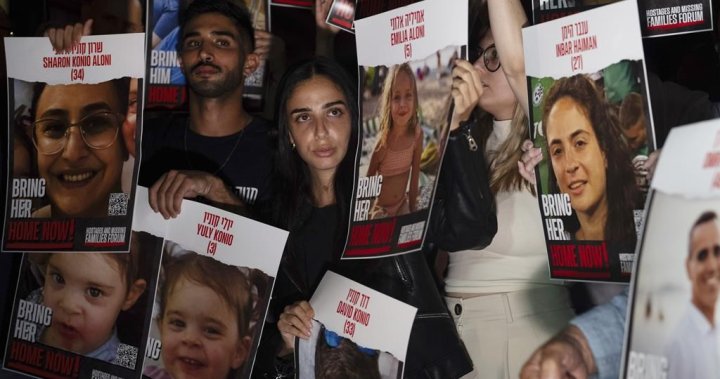Hamas’s deadly Oct. 7 attack on Israel claimed the lives of roughly 1,400 people.
Hamas initially appeared to have captured around 100 hostages, but that estimate has grown to around 200 –as has the number of groups who may be holding captives from the raid. Palestinian Islamic Jihad has claimed they are also holding around 30 hostages captured in Israel.
Only two people have been freed so far.
A former FBI hostage negotiator says the key to getting hostages back safely is negotiating for each person separately.
“There are [hostage-takers] that are doing this for political reasons. There are folks that are doing this… to hold them as human shields, or to try to get diplomatic concessions,” Phil Andrew told Mercedes Stepheson on The West Block.
“And each one of those [reasons] is going to reveal itself, if we’re careful in establishing the dialogue and engagement,” he said.
He said there are different reasons for treating each negotiation – and each hostage – separately.
First, it can reinforce the captives’ humanity with the captors.
“I think probably, after three weeks of being held, the hostage taker started to identify or connect with the hostages in some way. And to the degree that we can remind people that these are human beings… that makes it a little more difficult to do… those horrible acts of violence that was committed against others.”
“One of the things that we saw in the release of (Judith Tai Raanan and daughter Natalie, the first two hostages freed is that) it was pitched as humanitarian reasons,” Andrew told Stephenson.
At this point, a few weeks into captivity, Andrew said hostages are likely beginning to experience post-traumatic stress.
“The painful, traumatic experience of [their capture] is probably not something they’ve been able to even process,” he told Stephenson.
“But what we also see is that—that sometimes there is a connection, then, between the hostage and the hostage taker… that [the hostage-takers] really aren’t interested in causing continued pain and suffering.”
Secondly, he said its possible captors took the hostages to multiple locations or were taken by different groups with different goals – and that captors’ goals could change as the situation evolves.
Andrew said it’s important to engage hostage takers, especially those that function like a government like Hamas, on multiple fronts.
“This is where NGOs that might have influence, perhaps even organizations or entities where governments that we don’t necessarily see as partners, they may still have influence here and we have to open the dialogue and be open to any direction that that might—might go.”
American president Joe Biden thanked Qatar for its partnership after Hamas released its first two hostages.
Hamas said in a statement it was working with mediators “to close the case” of hostages if security circumstances permit. The group added that it is committed to mediation efforts by Egypt, Qatar and other countries.
Qatar said it would continue its dialogue with Israel and Hamas in hopes of winning the release of all hostages “with the ultimate aim of de-escalating the current crisis and restoring peace.”
“One of the things that we’re taught as journalists when we’re being trained if you’re ever taken hostage, is that the most dangerous time for a hostage is actually during a potential attempt at a rescue because you could either be killed by your hostage taker or inadvertently by the people trying to save you,” Stephenson said.
“How realistic do you think it is that (Israel and other countries) could rescue some of these hostages?” she asked Andrew.
“They are very risky. They’re not only risky to the hostages, but they’re risky to the operators,” Andrew replied
“So that… is all the more reason that we move methodically. We take the time to gather the information, to exhaust all the less dangerous ways, and recognize that the release of two (hostages) should give us hope that there’s potential for more folks being released.”
With files from Reuters and the Associated Press.
© 2023 Global News, a division of Corus Entertainment Inc.



